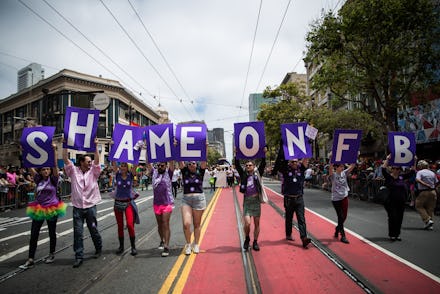One Trans Former Facebook Employee's Story Proves Equality Wasn't Won With Marriage

Given Friday's Supreme Court's ruling which requires states to recognize same sex-marriage, it seemed that Pride events over the weekend would have been particularly joyous. But at least one group at the San Francisco Pride Parade felt otherwise, and took the opportunity protest a persistent form of discrimination they still face: Facebook's "authentic name" policy, which requires users to provide their "real" names on their profiles.
One former Facebook employee — a transgender woman who says she initiated Facebook's custom gender feature, in fact — was personally confronted by this policy while at a trans pride event on Friday.
"Facebook decided my name was not real enough and summarily cut me off from my friends, family and peers and left me with the stark choice between using my legal name or using a name people would know me by," the individual, who goes by the name Zip, wrote Saturday on Medium.
A safety issue, on all sides: Facebook explains this policy exists because the platform is "a community where people use their authentic identities," requiring individuals to "provide the name they use in real life" primarily for safety reasons — so that people know with whom they're connecting. But many question this logic.
According to its policy, Facebook believes using "real" names instead of handles encourages users to, in Zip's words, "add people they [are] genuinely friends with and to talk about their daily lives" and increase interaction. Others say this rule discourages interraction because it ignores the distinction between identification and identity; some people may use a name other than their legal name because of changes in their gender identity or expression. Even performers like drag queens have had problems keeping their profiles active due to this policy. It's the reason a group of LGBTQ people jumped ship from Facebook to Ello last year.
Many argue that using one's "real" name can also directly threaten personal safety. San Francisco drag queen and activist Sister Roma, for example, met with Facebook in September 2014 to stress that some queer people use fake names when they do not feel they can be safely out, as do others, like survivors of domestic violence and/or stalking, CNN reported. And others — including Native American users, victims of online harassment and even international dissidents — have rubbed up against the limitations of this policy as well.
In addition to (true) personal authenticity and safety, Zip wrote that the social networks' policy is meaningful on the broader scale of the LGBTQ community.
"Facebook is a vital tool for community, especially for those of us who are marginalized," Zip wrote. "It withholds our access to friends and support in order to enforce their policy, and in so doing we are faced with a stark choice between a name we do not identify with and do not want to use, or being disconnected."
Nonetheless, Facebook spokesman Andrew Souvall told CNN in September the policy "helps prevent bad behavior while creating a safer and more accountable environment." It's since scaled back its rules to allow more people to use names they are comfortable with, but users like Zip still incur problems.
That's why activists are speaking out. The San Francisco Pride Parade protest and Zip's testimony add to a legacy of varied protests, including the creation of MyName.is — an online identity tool — as well as organizing on Twitter using the hashtag #nymwars.
"It's an insult that Facebook is sponsoring Pride in SF, marching and flying the rainbow flag and helping everyone change their profile picture, when they cannot fix this simple thing," Zip concluded. "Technology is not neutral, and a technology that a billion people use to communicate has the power to warp and change reality around itself."
While marriage equality is certainly a long-fought victory for the LGBTQ community, it's clear more issues of inequality remain. Whether it's other broader scale forms of legal discrimination — like employment discrimination and healthcare barriers — or daily threats like this name policy, it's clear the nation still has a long way to go before it can consider itself a land truly devoted to equality for all.